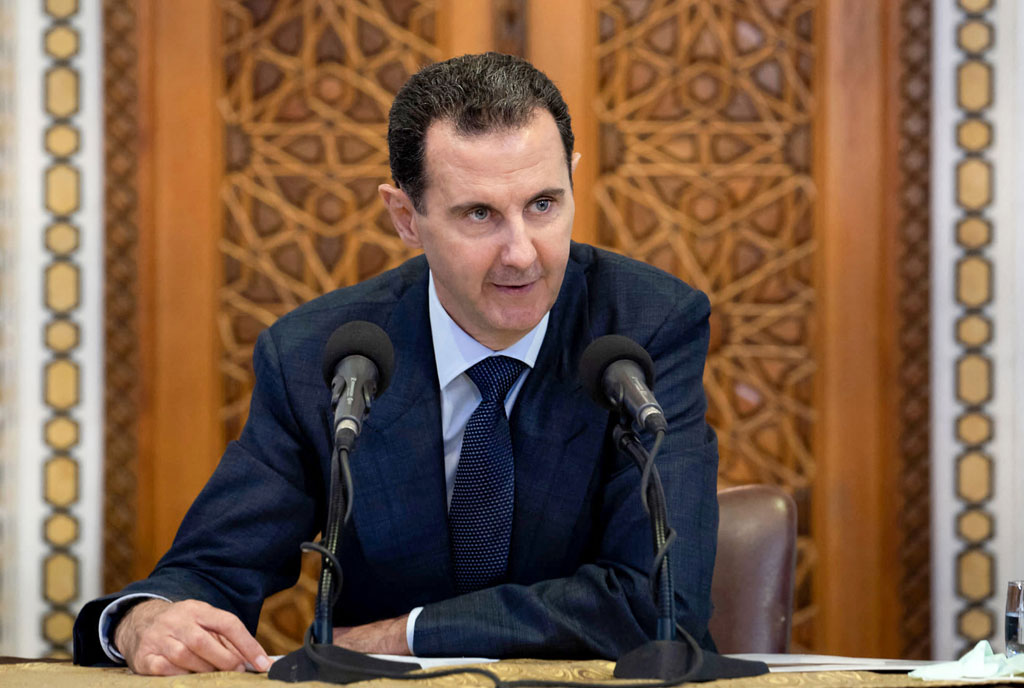Assad regime in the dock in Europe

This handout picture released by the Syrian Presidency Facebook page on December 7, 2020, shows Syrian President Bashar al-Assad delivering a speech during the periodic meeting held by the Ministry of Endowments at Al-Othman Mosque, in Damascus. PHOTO/AFP
What you need to know:
- The violations also include the use of chemical weapons as a tool "to intimidate and punish the civilian population", which Syria denies, and unlawful detentions.
France, which has issued a warrant for the arrest of Syrian President Bashar al-Assad, is one of several countries using the principle of universal jurisdiction to try to obtain justice for victims of atrocities in Syria's civil war.
Universal jurisdiction allows states to prosecute the most serious crimes, regardless of where they were committed.
Here are some of the cases brought against Assad's regime:
Germany: Trailblazer
Germany, which welcomed hundreds of thousands of Syrian refugees at the height of the war in 2015-2016, used the principle of universal jurisdiction to convict a former Syrian colonel, Anwar Raslan, of crimes against humanity and jail him for life in prison in the first global trial over state-sponsored torture in Syrian prisons.
Raslan, who moved to Germany after deserting from the army, was found guilty of overseeing the murder of 27 people and the torture of 4,000 others at a detention centre in Damascus in 2011 and 2012.
Days after he was sentenced in January 2022, a Syrian doctor, Alaa Mousa, went on trial in Frankfurt accused of torture, murder and crimes against humanity in military hospitals, including setting fire to a teenage boy's genitals.
That trial is still ongoing.
The first ex-regime member to be convicted over the Syrian war was former intelligence officer Eyad al-Gharib, who was arrested alongside Raslan in Berlin in February 2019.
He was sentenced to four-and-a-half years in prison in 2021 for helping transport demonstrators to prison despite knowing they would be tortured.
France: seeking regime leaders
France on Wednesday issued an arrest warrant for Assad, his brother Maher and two generals, accusing them of complicity in crimes against humanity and war crimes over chemical attacks in 2013.
The sarin gas attacks near Damascus in August 2014 killed more than 1,000 people, according to US intelligence.
Then US president Barack Obama toyed with the idea of military action against the regime over the attacks but decided against doing so at the last minute.
The first trial of senior Syrian regime officials is planned in May 2024.
Ali Mamlouk, head of the National Security Bureau of Assad's Ba'ath party, Jamil Hassan, former head of the Air Force Intelligence Directorate, and Abdel Salam Mahmoud, another Air Force intelligence officer, are set to go on trial in absentia over the torture and disappearance of a French-Syrian father and son in Syria in 2013.
France is also seeking four other senior regime members believed to have ordered a 2017 bombardment that killed a French-Syrian former teacher.
The four, who include then defence minister Fahd Jassem, are accused of complicity in a war crime over the bombing of the victim's apartment block in the southern city of Daraa.
Sweden: first conviction
Sweden was the first country to sentence a former Syrian soldier for war crimes in 2017.
The man, who sought asylum in Sweden, was charged over photographs on the internet showing him standing smiling over a pile of bodies, with his boot on one corpse.
While the court could not prove he was responsible for the deaths, it said the picture represented a grave violation of the dignity of the dead and sentenced him to eight months in prison.
The Hague: first international case
The first international case over the conflict was launched by Canada and the Netherlands, who brought Damascus before the International Court of Justice in The Hague in June 2023 over allegations of torture.
The case alleges "abhorrent treatment of detainees, inhumane conditions in places of detention, enforced disappearances, the use of sexual and gender-based violence, and violence against children."
The violations also include the use of chemical weapons as a tool "to intimidate and punish the civilian population", which Syria denies, and unlawful detentions.
The case could take years.





